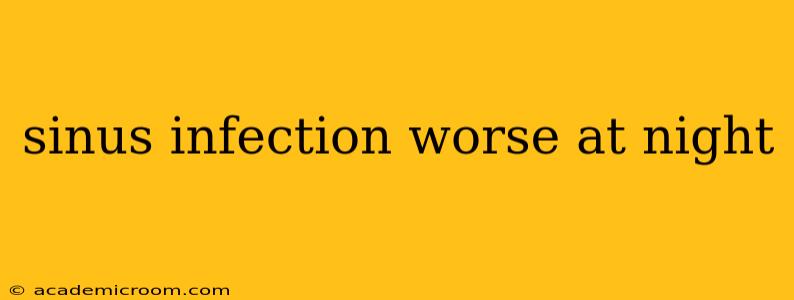Sinus infections, or sinusitis, are a common ailment characterized by inflammation and swelling of the tissue lining the sinuses. While daytime discomfort is often challenging, many sufferers find their symptoms significantly worsen at night. This nighttime exacerbation isn't just annoying; it can severely impact sleep quality and overall well-being. Let's explore why your sinus infection feels worse at night and what you can do to find relief.
Why Are Sinus Symptoms Worse at Night?
Several factors contribute to the nighttime intensification of sinus infection symptoms:
-
Body Position: When you lie down, mucus and fluid accumulate in your sinuses, increasing pressure and discomfort. Gravity plays a crucial role here; during the day, the fluid drains more easily. This pooling of mucus leads to increased congestion and pain.
-
Increased Blood Flow: Your body temperature naturally drops slightly at night. While this is generally beneficial for sleep, it can also lead to increased blood flow to inflamed sinus tissues, causing greater swelling and pain.
-
Hormonal Changes: Hormonal fluctuations throughout the day and night can influence inflammation levels. Some research suggests a link between these fluctuations and increased sensitivity to pain during certain times, including nighttime.
-
Dehydration: Many people drink less fluid in the evening, leading to dehydration overnight. This thicker mucus is more difficult to drain, exacerbating congestion and discomfort.
-
Environmental Factors: Dust mites, pet dander, and other allergens might be more prominent in your bedroom, triggering or worsening your sinus infection symptoms. Poor bedroom ventilation can also contribute to a buildup of irritants.
What Can I Do to Relieve Nighttime Sinus Pain?
Managing nighttime sinus pain requires a multi-pronged approach that addresses the underlying causes:
Elevating Your Head:
Sleeping with your head elevated can significantly reduce the pooling of fluids in your sinuses. Using extra pillows or a wedge pillow can provide comfortable elevation.
Hydration:
Drinking plenty of fluids throughout the day, and even a glass of water before bed, helps thin the mucus, making it easier to drain.
Humidification:
Dry air can worsen sinus congestion. A humidifier can add moisture to the air, helping to loosen mucus. A cool-mist humidifier is generally preferred to avoid burns.
Saline Nasal Spray or Rinse:
Using a saline nasal spray or rinse can help clear nasal passages and alleviate congestion. This is an effective way to remove irritants and excess mucus.
Over-the-Counter Medications:
Over-the-counter pain relievers like ibuprofen or acetaminophen can help manage pain and reduce inflammation. Decongestants can temporarily relieve congestion, but they shouldn't be used for extended periods.
Avoiding Irritants:
Minimize exposure to allergens and irritants in your bedroom. This may include using hypoallergenic bedding, regularly cleaning your bedroom, and ensuring proper ventilation.
Is a Sinus Infection Worse at Night Than During the Day?
While not universally true for everyone, many individuals experience a significant worsening of their sinus infection symptoms at night. This is due to a combination of factors including gravity, body position, hormonal changes, and environmental factors within the bedroom.
How Can I Sleep With a Sinus Infection?
Prioritizing sleep during a sinus infection is crucial for recovery. Combining the strategies mentioned above – elevating your head, staying hydrated, using a humidifier, and taking over-the-counter medications – can dramatically improve your ability to sleep comfortably. Consider practicing relaxation techniques to help manage any anxiety or discomfort that may interfere with sleep.
When Should I See a Doctor for a Sinus Infection?
If your sinus infection symptoms persist for more than 10 days, worsen significantly, or are accompanied by fever, severe headache, or facial pain, consult a doctor. They can properly diagnose the issue and recommend appropriate treatment, potentially including prescription medication.
By understanding why your sinus infection feels worse at night and implementing these strategies, you can significantly improve your sleep quality and manage your discomfort throughout the night, paving the way for faster recovery. Remember, consistent self-care is key to overcoming a sinus infection.
